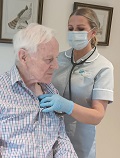
Lisa ANP Trainee, BHSCT
ADVANCED NURSE PRACTITIONER – District Nursing
The Advanced Nurse Practitioner is a highly experienced, expert member of the District Nursing team who provides person-centred care and practices autonomously within their expanded scope of practice in line with the DoH (2016) Advanced Nursing Practice Framework. They are accountable for the total episode of care for people with undifferentiated and undiagnosed needs.
They undertake comprehensive health assessments, and manage a range of illnesses and conditions that present in community settings, such as acute illnesses, exacerbation of long term conditions, palliative and end of life care needs. They also practice within a framework of Comprehensive Geriatric Assessment and management of frailty.
The Advanced Nurse Practitioner leads on population health, developing and sustaining partnerships with a wide range of stakeholders. They also develop networks to influence and improve healthcare outcomes and healthcare delivery, as well as addressing health inequalities. They educate, supervise and mentor nursing colleagues and other healthcare professionals. The Advanced Nurse Practitioner contributes to and undertakes activities, including research, monitors and improves the quality of healthcare and the effectiveness of practice.
| View the Competencies | View the Job Description | View the Education Requirements |
-
DIRECT CLINICAL PRACTICE
The Advanced Nurse Practitioner will:
- Practise autonomously, using a person-centred approach, within the expanded scope of practice.
- Demonstrate comprehensive skills for assessment, diagnosis, treatment, management and prescribing within the field of practice.
- Use clinical judgement in managing complex and unpredictable care events, drawing upon an appropriate range of inter-agency and professional resources in his/her practice.
- Demonstrate ability to manage and negotiate person-centred health related/care needs for patients and their families.
- Monitor and report quality issue affecting the provision of advanced nursing care delivery.
-
LEADERSHIP AND COLLABORATIVE PRACTICE
The Advanced Nurse Practitioner will:
- Develop and sustain partnerships and networks to influence and improve healthcare outcomes and healthcare delivery.
- Engage stakeholders and use high-level negotiating and influencing skills to develop and improve practice, processes and systems.
- Provide professional and clinical advice to colleagues regarding therapeutic interventions, practice and service improvement.
- Demonstrate resilience as a clinical and professional leader.
- Develop robust governance systems by interpreting and synthesising information from a variety of sources in order to contribute to the development and implementation of evidence-based protocols, documentation processes, standards, policies and clinical guidelines and promote their use in practice.
-
EDUCATION AND LEARNING
The Advanced Nurse Practitioner will:
- Continue to keep knowledge and skills up to date by engaging in a range of relevant learning and development activities.
- Educate, supervise or mentor nursing colleagues and others in the healthcare team.
- Advocate and contribute to the development of an organisational culture that supports continuous learning and development, evidence-based practice and succession
planning. - Lead person-centred care using a practice development approach.
- Lead and contribute to a range of audit and evaluation strategies which inform education and learning.
-
RESEARCH AND EVIDENCE-BASED PRACTICE
The Advanced Nurse Practitioner will:
- Contribute to and undertake activities, including research, that monitor and improve the quality of healthcare and the effectiveness of practice.
- Critically appraise the outcomes of relevant research and evaluations and apply the information to improve practice.
- Advocate and contribute to the development of a research culture that supports evidence-based practice.
- Lead and contribute to publications and dissemination of work.
- Demonstrate an understanding and application of a range of research methodologies.



